“Why is my dog breathing fast?” is a fairly common question from dog parents. Sometimes rapid breathing can be normal, but other times it may signal a problem. Integrative veterinarian, Dr. Julie Buzby, puts your mind at ease by explaining how to tell if your dog’s breathing is normal and discussing 10 conditions that may cause your dog to breathe fast.
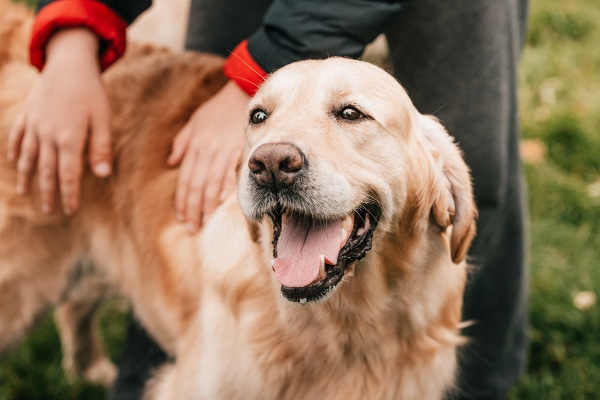
As a dedicated dog parent, you may spend a lot of time staring at your adorable dog. So it only makes sense that sometimes you might wonder if what you are seeing is normal. This is especially the case with breathing because your dog’s rate and type of breathing can vary greatly through the day.
My goal is to help you understand what is “normal” for your dog and when you might need to call a vet. To begin, let’s take a look at my dog, Jake, for a baseline on normal breathing.
What is “normal” breathing for a dog?
Being a hound, Jake likes to spend some of his day lounging around the house. At rest, he should be breathing easily through his nose with his mouth closed. If I were to count how many times he breathes (inhales and exhales) in minute, it would probably be around 10 to 35 times. (For more details on how to measure your dog’s respiratory rate, check out my article, Keeping a “Pulse” on Your Dog’s Vital Signs).
Sometimes during REM sleep, he will be breathing fast while sleeping. He may also whimper, twitch, or growl as he dreams. As long as I can wake him up and he acts (and breathes) normally once he is awake, this isn’t a cause for concern. These actions are probably just a dream, not something more scary like a seizure in dogs.
If he goes outside and romps with my kids in warm weather, he may start panting with an open mouth and his tongue sticking out. This is a normal way for dogs to cool down since they don’t have as many sweat glands as people do. As long as he isn’t panting extremely hard, is still acting normal, and stops panting once he cools down inside, I’m not too worried.
What is “abnormal” breathing for a dog?
Now that you have an idea of what is normal breathing, let’s talk about what might be a cause for concern. Be on the look out for:
- Rapid breathing (greater than 40 breaths per minute), especially while resting or sleeping.
- Abnormal noises (grunts, squeaks, or harsh sounds) while breathing.
- Panting for seemingly no reason (no recent exercise, environment is cool, not laying in a sunbeam).
- Rapid breathing through a slightly open mouth without the tongue sticking out.
- Increased respiratory effort (pushing with the abdomen to get air in or out).
- Shallow rapid breathing or abnormally slow and deep breathing.
- Bluish tinge to gums or tongue.
- Breathing hard or fast while standing up and being unwilling to rest or lie down for long.
- Acting like he or she can’t catch his or her breath or looking distressed.
If you notice any of these signs, this may mean that your dog is experiencing breathing issues. Immediately bring him or her to your veterinarian for evaluation and treatment. Respiratory distress can be fatal, so don’t delay in getting help for your dog.
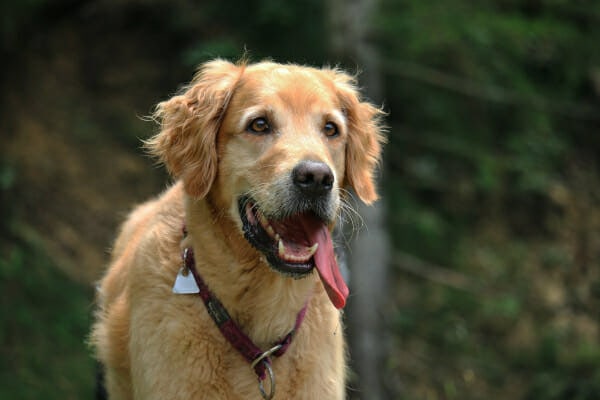
10 reasons why my dog is breathing so fast
From here on, we are going to talk about some of the common medical conditions that may cause your dog to be breathing fast and/or breathing abnormally. Be warned that many conditions can cause similar signs and not every possible problem is listed here. Your vet is the best person to diagnose and treat your dog if he or she is having breathing problems.
1. Laryngeal paralysis
Your dog’s larynx is also called a “voice box” because of its box-like shape and role in making sounds. It is located in the back of the throat at the top of the trachea. Small muscles cause the laryngeal flaps to cover the tracheal opening when your dog eats and drinks. They also pull the laryngeal flaps out of the way while the dog breathes to allow maximal airflow into the trachea.
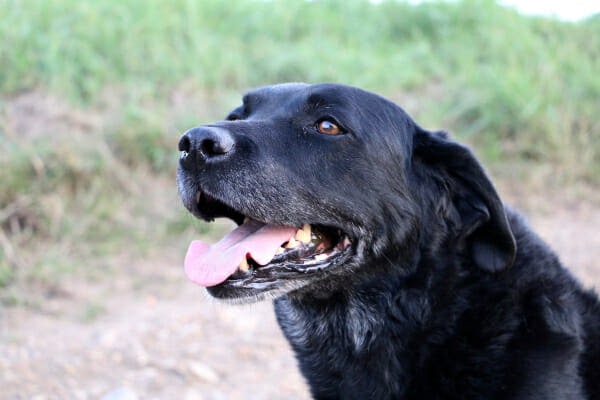
If there is a problem with the nerves that control the laryngeal muscles, the laryngeal flap(s) don’t move and can partially obstruct the entrance to the trachea. This creates resistance as air moves past the defective flap(s) and means less air gets to the lungs.
Neck trauma and other underlying health issues can cause laryngeal paralysis in dogs . However, in senior dogs, the cause is often unknown. Researchers believe it may be one component of condition called geriatric onset laryngeal paralysis and polyneuropathy (GOLPP). Dogs who have GOLPP may also suffer from generalized muscle weakness and esophageal dysfunction. Laryngeal paralysis seems to be more common in some breeds such as German Shepherd dogs, Labrador Retrievers, and Golden Retrievers but can occur in any dog.
Signs of laryngeal paralysis in dogs include:
- Raspy or harsh breathing
- Changes in your dog’s “voice” (bark sounds different)
- Increased panting
- High-pitched noisy breathing which worsens when excited or active
In severe cases, laryngeal paralysis can cause acute respiratory distress. If you see that your dog is having breathing difficulties or his gums appear blue in color, contact your nearest veterinarian immediately. Some dogs with laryngeal paralysis benefit from tie back surgery for dogs and/or medical and environmental management (more on that in my blog Canine Laryngeal Paralysis: A Veterinarian Answers Your Questions).
2. Tracheal collapse
The trachea is the large tube-shaped structure that runs down the neck and into the chest before splitting into the main bronchi (i.e. airways) that lead into the lungs. Among other things, the trachea functions to deliver oxygen-rich air to the lung tissue and transport carbon dioxide-laden air back to the outside world.
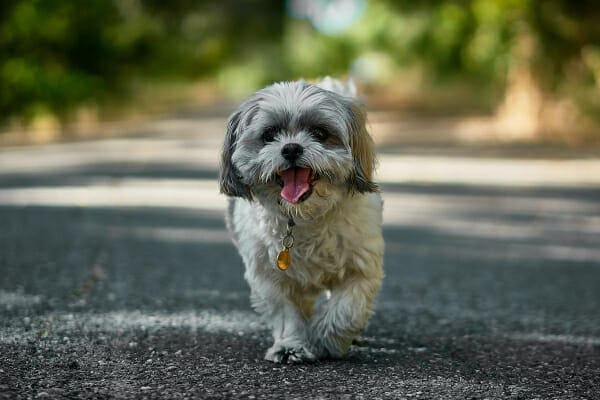
A healthy trachea is comprised of firm cartilaginous rings that make up about 80% of the circumference of the trachea. The other 20% is a soft-tissue structure called the dorsal tracheal membrane that spans the space between the edges of the rings.
As dogs age, the cartilaginous tracheal rings lose their rigidity, and the dorsal membrane tends to sink down into the tracheal space. These conditions cause compression of the airway, shrinking the amount of space through which air can move. Picture this sort of like trying to drink a thick milkshake through a flimsy straw. The straw tends to collapse so you don’t get much milkshake.
The same thing happens in collapsed trachea in dogs. As the trachea collapses and narrows during breathing, the dog can’t get as much air into or out of the lungs. This leads to frequent coughing (sounds like a goose honking), rapid breathing, and sometimes respiratory distress. Immediately contact your vet if your dog is having trouble breathing.
Tracheal collapse can happen in any dog, but it tends to be more common in Chihuahuas, Shih Tzus, Yorkshire Terriers, Boston Terriers, Pomeranians, Lhasa Apsos, and Toy Poodles. Obesity also tends to make tracheal collapse more severe. This is one of the many reasons why it is important to know how to assess the canine body condition score (BCS) of your dog and learn how to help your dog lose weight if needed.
3. Respiratory infections and pneumonia
Many bacterial, viral, and fungal agents can infect the respiratory tract (nose, trachea, airways, and lung tissue). Some infections remain contained to the trachea or larger airways where they cause inflammation of those structures.
Kennel cough (infectious tracheobronchitis) is a well-known airway and trachea infection that may be caused by a multitude of bacteria or viruses. Dogs with an uncomplicated case of kennel cough may only have a harsh cough but still breathe normally.
However, sometimes the agents causing kennel cough (or other infectious agents) can spread deep into the lung tissue, causing pneumonia. Alternatively, a dog may develop aspiration pneumonia if he or she breathes in a bit of food, fluid, or vomit. This can happen to any dog but is more common in dogs with laryngeal paralysis because their airway is unprotected due the the malfunctioning laryngeal flaps.
Pneumonia is problematic because the alveoli (i.e. airsacs) in the lungs become filled with fluid and debris from the infection. Now the alveoli can’t do their job of exchanging carbon dioxide for oxygen as effectively. This may lead to low oxygen in the blood and fast or difficult breathing. Fever and a lethargic dog are two other common pneumonia symptoms.
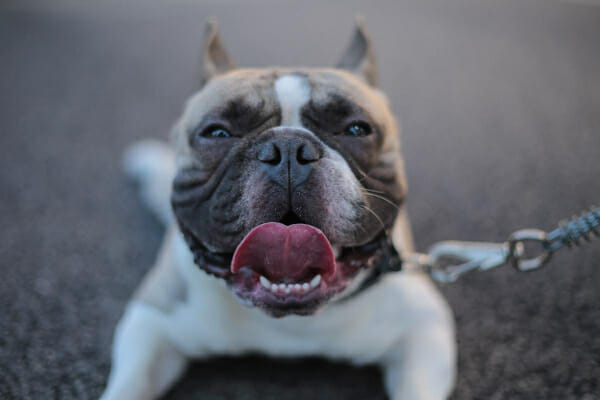
4. Lower airway disease
There are any number of diseases that can affect the lower respiratory tract such as bronchitis (inflammation of the bronchioles or small airways) and chronic obstructive pulmonary disease (COPD), which is a type of progressive and chronic bronchitis. The cause for some of these lower airway diseases is unknown, but factors like obesity, infections, and environmental irritants can worsen the intensity of symptoms.
Ongoing inflammation causes narrowing of the lower airways. This makes it more difficult for oxygen to get to the lungs and for carbon dioxide to leave the lungs. As a result, dogs with lower airway disease may cough frequently. They may show fast, heavy breathing and they may pant more often. Sometimes even mild physical activity can cause breathing difficulties, and severely affected dogs may collapse due to lack of oxygen.
If your dog is coughing or breathing fast, make an appointment with your veterinarian. Also, observe whether the respiratory problems seem to be linked to exposure to anything in the environment (i.e. cigarette smoke, air fresheners, candles, pollen, etc).
5. Heat stroke
In order to help regulate their body temperature, humans sweat through special glands in their skin when they get hot. As the sweat evaporates, it helps to cool them down. However, dogs only have sweat glands in their paws. This is not enough to help them cool off completely, so they rely on panting as a primary mechanism for dissipating heat.
Sometimes there are instances where a dog’s body cannot cool down fast enough. If a dog is stuck inside a car (even if the windows are cracked) on a hot day, panting is not enough to lower a rapidly rising body temperature as the temperature inside the car climbs. (To learn more, head over to the AVMA website to read their article about the dangers of pets in vehicles.)
Or if a dog is exercising on a warm day, he or she can easily overheat. Many dogs will keep on playing even when they are extremely hot, so you can’t rely on them to know when to stop.
By the time the dog’s body temperature goes beyond 106 degrees Fahrenheit, the internal organs can start to shut down. This condition is called heat stroke in dogs, and it is a life-threatening medical emergency.
Some of the tell-tale signs of heat stroke in dogs are:
- Heavy panting or difficulty breathing
- Collapse
- Disorientation and/or seizures or tremors
- Vomiting and/or diarrhea
- Change in gum color—may be bluish purple, grey, or bright red
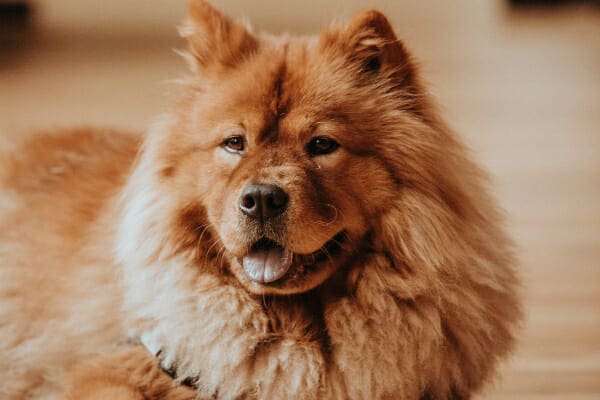
If you notice any of these signs, immediately head to the veterinary clinic ASAP with the A/C blasting. You can quickly hose your dog down with cool water before jumping in the car but do not submerge your dog in water or use an ice bath as both could be dangerous.
Use caution in the heat
Especially during the summer, it is very important to protect your dog from the heat. Even a slightly warm day can turn deadly, especially for dogs who are more prone to heatstroke. While all dogs could have heat stroke, it tends to be more common in:
- Dogs with a dark or thick haircoat that holds heat.
- Brachycephalic breeds (i.e. those with short noses) because they often have small nasal passages, a narrowed airway due to an elongated soft palate, tiny nostrils, and a skinny trachea, all of which make breathing and getting rid of heat quite difficult.
- Overweight or obese dogs. (Unsure? Read my post, Is My Dog Overweight?)
- Dogs with medical conditions such as heart disease, laryngeal paralysis, or collapsed trachea.
6. Heart Disease
The heart is one of the most important organs in your dog’s body because it pumps oxygen-rich red blood cells throughout the body. Pressure from the heart is part of what drives oxygen-depleted cells back toward the lungs in order to restock with the oxygen that a dog needs to survive. Anything that disrupts the heart’s function can be dangerous to your dog.
Heart disease in dogs can be defined as anything from electrical disturbances (e.g., arrhythmias) to disorders that affect the size and strength of the heart’s chambers (i.e. valvular disease, dilated cardiomyopathy or heartworm disease in dogs). The end result is a heart that is not functioning correctly.
When the heart isn’t distributing enough oxygen around the body, your dog will begin to breathe faster to try to compensate. As fluid pools in the lungs or abdomen due to congestive heart failure, breathing becomes even more difficult.
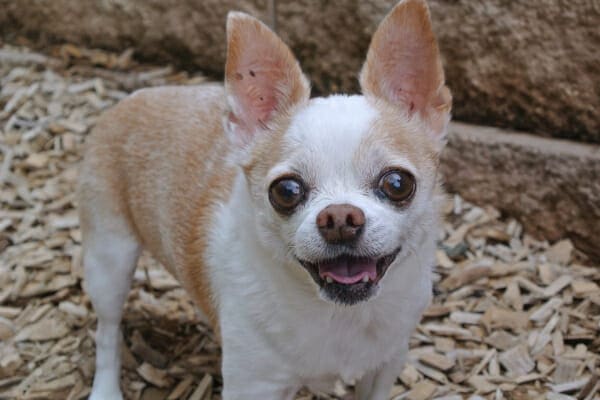
Some other common symptoms of heart disease in dogs include:
- Coughing, especially at night or when excited
- Exercise intolerance
- Breathing fast while sleeping or resting (over 40 breaths per minute)
- Blue or purple gums
- Collapsing episodes
- Respiratory distress
If you notice any of these signs, contact your vet immediately. Heart disease isn’t curable. But it can often be managed for a period of time with different medications to continue to allow your dog to have a good quality of life.
7. Pain
Dogs can experience pain for a variety of reasons and tend to be masters of hiding their pain. Sometimes they vocalize or favor a limb to show us they are hurting. Other times, signs of pain in dogs may be more subtle. Painful dogs may pant excessively or breathe fast while resting. They may also become more withdrawn and hide, hold their bodies abnormally, or exhibit other behavior changes.
Some common sources of pain in dogs include:
- Orthopedic problems such as canine arthritis, hip dysplasia in dogs, torn ACL in dogs, or IVDD in dogs
- Gastrointestinal problems like foreign bodies or pancreatitis in dogs
- Mouth pain from dental disease in dogs, dog tooth abscesses or older dogs losing teeth
- Ear or eye pain from infections or injuries
- Recent surgery
- Cancer
If you think your dog could be in pain, make an appointment with your vet. Although it may be tempting to share your pain medication with your dog, human medications like Advil can be dangerous for dogs, so don’t do it.
Recently, I was doing a wellness exam on a senior Scottie dog. His doting dad mentioned that he had been panting more often during the day and was acting a bit “off.” He had pristine senior bloodwork and his heart and lungs sounded great. However, he did tense up when I manipulated his hips and knees, so I suspected arthritis pain was becoming a problem.
We started him on a joint supplement for dogs, and I suggested a trial of a non-steroidal anti-inflammatory drug (NSAID). When his dad called with an update, he was thrilled to report that his pup was panting less and seemed like a new dog!
8. Cancer
Cancer in dogs can affect your dog’s breathing in a few different ways. If your dog has lung cancer in one of the lung lobes, inflammation and pressure from the tumor can cause coughing and trouble breathing. Cancer elsewhere in the body can metastasize (i.e. spread) to the lungs, which can also cause a dog to breathe more rapidly.
Additionally, certain cancers can cause fluid to accumulate in the lungs (i.e. pulmonary edema) or around the lungs (i.e. pleural effusion). Pulmonary edema interferes with the dog’s ability to exchange carbon dioxide for oxygen, and pleural effusion prevents the lungs from fully expanding. Both of these conditions can lead to an increased respiratory rate or changes in respiratory effort.
9. Anemia
Oxygen, which is vital for survival, is carried to the tissues on red blood cells. Thus, if a dog is anemic (i.e. has low red blood cell numbers) less oxygen can get to the tissues. When this happens, the dog may start breathing faster to try to compensate. Pale gums, lethargy, and weakness are other signs of anemia.

A variety of conditions can cause anemia including:
- Immune-mediated hemolytic anemia (i.e. body attacking it’s own red blood cells)
- Tick borne diseases
- Blood-sucking parasites (i.e. fleas, ticks, hookworms, etc.)
- Internal bleeding from trauma, hemangiosarcoma in dogs, splenic masses in dogs, GI ulcers, and other causes
- Bone marrow suppression from cancer, chronic disease, etc.
- Toxins, chemicals, and medications
- Cancer
Anemia can be life-threatening. If you suspect your dog could be anemic, bring your dog to the veterinarian immediately for testing and treatment.
10. Anxiety
If you are asking yourself, “Why is my dog panting and restless?” one of the possible answers is anxiety. In addition to panting excessively or breathing fast, anxious dogs may also yawn when not tired, cower and tremble, or become destructive or aggressive.
Dogs can become anxious for a variety of reasons, such as:
- Separation anxiety
- Noise phobia (i.e. thunderstorms, fireworks, construction, etc.)
- Changes in the home (i.e. new baby, new pet, visitors, moving, remodeling, etc.)
- Dementia in dogs
- Fear and stress associated with pain in dogs
- Senior dog anxiety at night
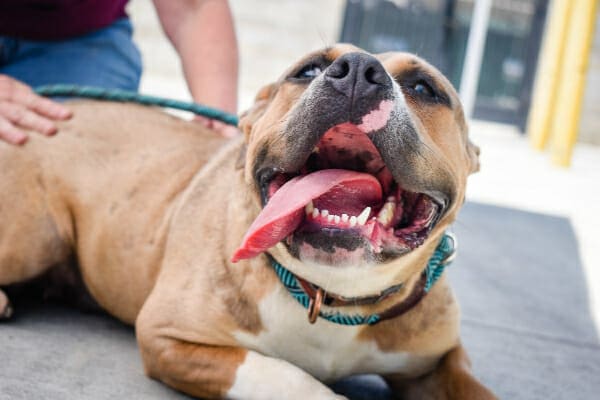
If you believe your dog is anxious, please talk to your vet sooner rather than later. Addressing anxiety when it first starts is much easier than addressing it when it has been reinforced by weeks, months, or years of anxiety-inducing situations. There are many pharmaceutical and non-pharmaceutical options that can help a dog deal with anxiety.
Speak with your vet
As you have probably gathered from this list, there are a variety of reasons a dog might be breathing fast and many of them can be quite serious or even life-threatening. If you are unsure if your dog is breathing normally, try to count his or her breathing rate (remembering that 10-35 breaths per minute is considered normal and anything over 40 breaths per minute is definitely a cause for concern). Also, consider taking a quick video of how your dog is breathing in case anything changes by the time you get to the vet.
Most importantly, seek veterinary care promptly if you have any concerns about how your dog is breathing. You know your dog, so trust your instincts. I know it isn’t easy to be intently staring at your dog and trying to decide if you should call the vet or wait and see what happens.
When in doubt, make the call. Maybe you will get the good news that your dog is fine. Or maybe your attention to detail will help your vet catch one of these conditions before it becomes more serious. Watching your dog’s breathing may even save his or her life!

If your dog was breathing fast, what was the cause?
Please share your pup’s story below so others can learn from your experiences.


My 15 year old Maltese (Lillee) passed away 3 weeks after dental surgery when the dentist removed most of her teeth–no definitive diagnosis for her passing–very disturbing; I am blaming myself for putting her through the surgery. Now, 5 weeks later her sister–also 15-year-old Maltese (Gigette) was just diagnoses with renal failure. I am devastated!!!!!
Dear Nancy,
My heart aches for you with the recent loss of your beloved Lillee. I understand why Gigette’s new diagnosis has left you devastated and heart broken. Please don’t carry the unnecessary burden of guilt over those last weeks of Lillee’s life. You did what you thought was best and I would have made the same choice for one of my own. You may never know the cause of her passing, but I am certain you did not fail her. I pray for your strength as you face some difficult days ahead. Make the most of the time you are gifted. Wishing you and Gigette comfort and peace.
Hi my dog well do takeing a nap and after about 10 to 20 minutes I noticed and he well take one deep breath then for about five seconds he well breathe then after the 5 seconds he well wake up breathing heavenly like he woke up from a nightmare or something what should I do
Hi Tabitha,
I understand your concern for your pup with this strange breathing while sleeping. Without witnessing it myself, it is hard to make specific conclusions. This could be normal as most dogs will have slow deep breathing while asleep. Dogs also dream and can have rapid breathing during these episodes. My best advice is to try and catch this on video. Then you can show your vet and they can advise you if any testing or treatment needs to be pursued. Best wishes and good luck!
Hi , so I woke up this morning to my 14 year old chihuahua breathing fast about 90 breaths a minute, seems very lethargic
Dear Veda,
What you describe sounds very concerning. Please contact your vet right away as this could be an emergency situation. Praying your little pup is ok.
My 6 month old puppy just had an upper respiratory infection and was checked last Tuesday and was told she was very healthy. I have been noticing rapid breathing at night time. She sleeps all night but I have noticed some panting at night as well. Could this be because of the most recent URI? There is no signs of sickness but wondering how soon before I mention this to the vet..
Hi Esmeralda,
I am not sure if what you are describing is something to worry about or if it is normal dreaming behavior dogs can exhibit while sleeping. I would recommend you go ahead and contact your vet. Don’t hesitate to call your vet anytime you notice a sudden change in your dog’s behavior. I always think it is best to play it safe and take action quickly.
My pup has been licking for days and just found a very bad Hotspot on his testicle, which is pink and swollen. He is breathing very rapidly and is restless. Could the rapid breathing come from the Hotspot? I found nothing about that in a Google search and I am very distressed.
Hi Meg,
I am sorry your pup is dealing with this concerning issue. A hotspot itself will not cause rapid breathing, but this could be a sign of pain in your dog. Also, there are situations where something that looks like a hotspot can actually be a sign of a more serious condition. I highly recommend you have this evaluated by your vet. Hoping you receive good news and can find the best way to give your sweet boy some relief.
Our dog (a 9 year old Australian Shepherd, Border Collie, Blue Healer mix) has been having episodes of heavy, rapid breathing. These episodes have been happening (mainly at night) for the past several months. Some background – he started having seizures last August and is on medication (phenobarbital). There isn’t a known cause for the seizures and blood work at the vet comes back ok. I’m looking for some guidance as to what could be causing these episodes and wondering how we can help manage or treat them. His energy levels have been decreasing and he doesn’t appear to sleep much at night with these episodes happening. I have also been up most nights listening to him breathing.
Hi Melanie,
I am so sorry your senior guy is experiencing these worrisome episodes at night. Without witnessing them myself, it is hard to narrow down a possible cause. Is there any way you could try to get this on video? Your vet may be able to diagnose the problem or recommend some testing after getting a good look at what is happening. Some dogs will normally breathe rapidly while dreaming, but the decreased energy you mentioned has me concerned. I think it would be best to get your pup evaluated by your vet and see if together you can come up with the best way forward. Wishing you both the best and feel free to leave an update if you have a chance.
hi, my 10 year old cockerpoo has been breathing about 60 to 80 breaths a minute for about a month. He also seems to be more hungry than usual. He gets very anxious at the vets but they did a blood test and said it didn’t seem to be cushings. I don’t like the thought of him being in any discomfort and would like him to have a thorough check. Is it possible to have a full body scan and a dental exam and how would I go about it please?
Hi Angie,
I understand your concern for your senior guy and these worrisome symptoms he is displaying. There are definitely options for more testing that can be pursued. Please talk to your vet about your wishes to investigate these issues further. Even if your vet does not have access to certain tests and imaging equipment in-house, they can always call in a referral to a specialist. Wishing you all the best!
Hi..thank you for all the advice here on your page
I have a 5 year older female Kelpie weighing approximately 35kgs..she is overweight and I am currently trying to cut her food intake to help her lose weight but lately ive noticed she is breathing very fast and heavy most of the time..the only time she might not is when she is in a very deep sleep
She takes about 60 breaths per minute so I am very worried
She does have bad anxiety too
She still loves to play fetch and chase the hose etc but I notice she has trouble getting up on her feet from laying down..thinking maybe her joints or hips could be causing her pain which could be a factor of her being overweight
I would just like to hear what you think could be the reason for her breathing this way please
Thank you
Hi Jodie,
I understand your concern over this fast breathing you are seeing with your Kelpie. A respiratory rate of 60 in a calm resting dog is very worrisome! Without examining your dog, myself, I can’t make specific conclusions. I am worried this could be a sign of something very serious and your pup could end up in a critical life-threatening situation if not addressed quickly. This could be heart related or even be a sign of internal bleeding. Please contact your vet as soon as possible to have your dog evaluated.
my 6yo standard poodle sleeps in his crate. He has had 2 incidents in the last week where he starts to breathe extremely labored, and as soon as I take him out of the crate he is fine. No other issues. Any thoughts?
Hi Stephen,
I understand your concern for your Poodle and these worrisome breathing issues. Without seeing it myself or personally examining your dog I really can’t make specific conclusions. Your best bet is to have him evaluated by your veterinarian. It would probably be extremely helpful if you could catch one of these episodes on video for your vet to see. Hoping all is well!
Your website has helped me some. Guess I want know for sure why my 5 week old puppy is breathing fast and noisy when she first wakes up, when she’s excited, and when she’s scared until I take her to the vet. When I hold her and pet her softly she stops the noisy breathing sounds and she doesn’t breathe noisy when asleep. I believe it’s anxiety,
Hi Sherry,
You are right to be concerned about your puppy’s breathing difficulties. It is unlikely a puppy so young would have anxiety issues. I highly recommend you schedule a visit with your vet as soon as possible. I hope you are able to get some answers and ensure your pup will have a long happy life ahead.
Thank you so much for all the information. My senior Sheppard/Hdog is 8 yrs old and is from a shelter, I have had her for a little over 8 months. She is the best and smartest dog. She is absolutely perfect inside the home, but outside is a different story. She is very athletic (even at her age, (I contribute that to the mix of dog she is.) and she loves to jump over our wall into the orchard in the back of my home. Most people know her by now. “: ) anyway, I noticed that when I got her, she, at times, would breathe very rapidly with short breaths. And at night, she does the same, at times. Today, was different. And there were behaviors that I have not seen in her before. So, I looked on your site, and found a lot of great information. the information was enough for me to make sure that I call the vet. She has only seen him once. that was when I first got her. But I never had any blood work done on her. I will be taking her to see the vet. I just want to thank you for all the great information. I think that she may possibly have something wrong with her. I will update you when I know. In reading on your site, you comfimed what I wanted to do, but thought that maybe I was jumping the gun and too paranoid. But, I can see now, this may be something more serious in her. And I adore her, her name is Missie. She is my loving companion.
Hi Lisa,
Thank you for all the kind words about the article. Your sweet girl is lucky to have you in her life and advocating for her health and wellbeing. I do think it is best to have her evaluated by your vet. I always think it is best to err on the side of caution when it comes to breathing issues. I hope everything is ok and you get a good report. Please do leave an update when you get a chance and give your pup a hug for me!
My dog is breathing fast and panting when ilt’s cold inside and it’s getting worse
Hi Lisa,
If you are concerned about your dog’s breathing, then I highly recommend you have him examined by your vet as soon as possible. Without having your vet take a look at your pup there really is no way to know if this is something to be worried about or not.